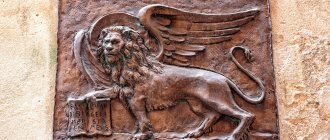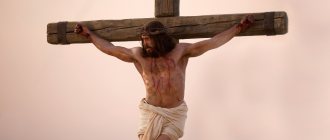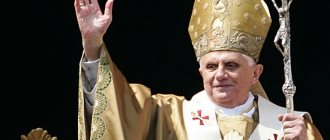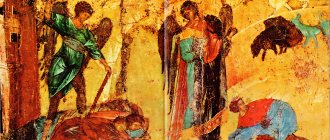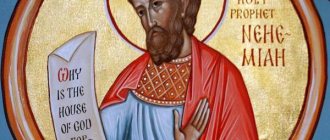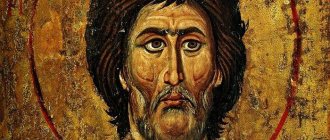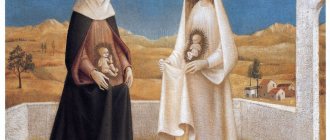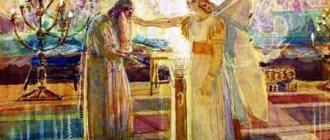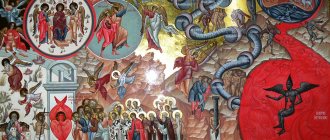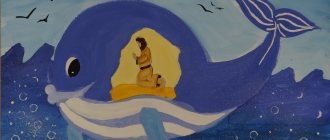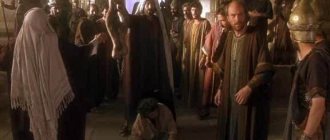"Save me, God!".
Thank you for visiting our website, before you start studying the information, please subscribe to our Orthodox community on Instagram, Lord, Save and Preserve † - https://www.instagram.com/spasi.gospodi/. The community has more than 60,000 subscribers. There are many of us like-minded people and we are growing quickly, we post prayers, sayings of saints, prayer requests, and timely post useful information about holidays and Orthodox events... Subscribe. Guardian Angel to you!
The prophet Isaiah is one of the great biblical natives of Jerusalem. He began his life's journey with great faith in his heart, since he was born into a pious family of clergy and from childhood he experienced great love for the Lord. He was meek and humble, for he knew that everything in a person does not depend on human nature, which is subject to constant change, but on intentions and spirit, strengthened by God’s word.
The glory of his earthly exploits lives to this day. And the life of the saint is striking in that, under any conditions, his affirming life principle remained one - with faith in his heart for everyone.
Path of Prophecy
He began to see his first visions at the age of 20: he saw heavenly Angels and communicated with them. From that moment his prophecies and real miracles began. Among the most famous:
- extermination of enemy troops who attacked their native land (Judea);
- healing the king from a serious illness and extending his life for another 15 years.
Despite the fact that Isaiah was married to a pious prophetess and had a son, Jasub, he spent his entire life alone. Isaiah the hermit - this is how one can call his spiritual path in the earthly world.
The prophet died a martyr's death. By order of the king of Judah, it was sawed down with a wooden saw. Some time after the burial, the saint’s relics were transferred to Constantinople and left in the Church of St. Lawrence. And part of the chapter of Isaiah is still kept on the holy Mount Athos.
The best article for you, go to: What is faith in God in Orthodoxy?
Even during his lifetime, the saint was called the Messiah, therefore, even after his departure, the prophecy of Isaiah became a household name and to this day remains one of the main predictions in Orthodox culture.
In the book of prophecies that the saint left behind, he:
- denounces the Jews for their unfaithfulness to the Lord;
- predicts the wanderings of the Jews, the restoration of Jerusalem and the main temple of the city;
- prophesies the fate of neighboring peoples, facts about which have forever entered world history.
But his most important prophecy for all Christians in the world was the coming of Christ, which he described with particular clarity and in great detail. In his stories, Isaiah called the Savior God and Man, Teacher of all nations, Founder of the Kingdom of peace and love. He also predicted his birth and suffering for all the sins of the world, and foresaw the great Resurrection.
Isaiah 66 chapter. Brief comment. Interpretation
In chapter 66, God returns to the theme of punishing believers who turned religion into human traditions and formalism, which were discussed in chapters 1 and 58 of the book of Isaiah, and the apostates, exposed in the previous chapter of Isaiah 65: 2-4, with the repetition of their sins.
Isaiah 66: ...3 He who offers sevendal is the same as he who offers swine’s blood; burning incense is the same as praying to an idol; and how they have chosen their own ways , and their soul delights in their abominations , 4 ... I will bring upon them a terrible thing for them: because I called, and there was no one to answer, I spoke, and they did not listen, but did what was evil in My sight and they chose what was displeasing to Me. 17 Those who sanctify and purify themselves in the groves , one after another, eat swine's flesh and abominations and mice, they will all perish, says the Lord.
Here the Lord speaks of the blessing of the remnant, who build their faith and religion not on “their own path,” that is, not on traditions invented by themselves, but who tremble before the Word of God, that is, before the Scriptures (the Bible).
Isaiah 66:2 ... But this is the one I will look upon: the one who is humble and contrite in spirit and who trembles at My word. 5 Hear the word of the Lord, you who tremble at His word
And again God speaks of the creation of a new people, giving an illustration of childbirth.
Isaiah 66:8 Who has heard such things? who has seen anything like this? did the country arise in one day? Was a people born at one time, like Zion, as soon as she began to suffer from childbirth, she gave birth to her sons?
This new people will be blessed in Jerusalem and will carry the Gospel far beyond its borders. And other nations will flock to Jerusalem.
Isa.66:10 Rejoice with Jerusalem and rejoice in her, all you who love her! … 13 As his mother comforts someone, so will I comfort you, and you will be comforted in Jerusalem . 19 And... I will send of those saved from them to the nations : to Tarshish, to Pul and Lud,... to the distant islands that have not heard of Me ...: and they will proclaim My glory to the nations 20 and present all your brothers from all nations as a gift to the Lord... , to my holy mountain, to Jerusalem, says the Lord, just as the children of Israel bring a gift to the house of the Lord in a clean vessel. 23 Then from month to month and from Sabbath to Sabbath all flesh will come before Me to worship , says the Lord.
There is a clear theme here of spreading the message of Yahweh beyond the borders of Israel. The only difference from the New Testament is that the converted nations go to worship the Lord in the Temple of Jerusalem. And this also does not contradict New Testament history. This is explained by the fact that God planned that the Remnant of Israel, returning from Babylon, would become His missionaries and, together with the Messiah (Christ), they would turn Jerusalem into the center of God’s worship on earth. But this did not happen due to the fact that not all of the Israelis left Babylon, having become accustomed to the prevailing life. Those who came out did not particularly want to bring the message about God to the world, but, on the contrary, closed themselves off among their people, isolating themselves from the pagans.
Meanwhile, the Apostle Paul believed that this prophecy was fulfilled in the bringing of the Gospel by Christians who converted the pagans to faith in the God of Israel:
Rom.15:12 Isaiah also says: The root of Jesse will rise up to rule the nations; The pagans will hope in Him. 16 to be a minister of Jesus Christ among the Gentiles and [perform] the sacred act of the gospel of God, so that this offering of the Gentiles, being sanctified by the Holy Spirit, may be acceptable to [God].
The message of blessing alternates in chapter 66 with the message of punishment for sinners. These texts seem to be talking about the Great Judgment and the killing of all the wicked in Gehenna at the end of earthly history, which is written about in chapter 20 of the book of Revelation. However, the text itself does not allow such a conclusion, because Isaiah directly names those to whom the curses are directed:
Isaiah 66:17 Those who sanctify and purify themselves in the groves, one after another, eat swine's flesh and abominations and mice, they will all perish, says the Lord. 24 And they will come out and see the corpses of the people who have departed from Me : for their worm will not die, and their fire will not be quenched; and they shall be an abomination to all flesh.
Verse 17 repeats the description of the Israelites mired in idolatry mentioned above in Isa. 65:2-4 and Isa. 66:3. And in text 24 the term “those who have departed from Me” is directly mentioned. Only those who knew God and apostatized from Him can be called apostates. A pagan who never knew the Lord cannot be called an apostate, since he did not retreat from the God of Israel, but lived according to pagan traditions all his life.
It is also important that we are talking about corpses, and not about souls without bodies, supposedly suffering in Gehenna. In the picture described, we see how the believers who came to worship in Jerusalem, leaving, will see in the valley of the sons of Hinnom (He Hennom) behind Jerusalem on the western side, the corpses of the apostates of God, which are being eaten by worms. It is from the name of the valley Ge Hennom, where the apostate Israelites first celebrated cults of idolatry, and then there was a stinking dump with smoldering sewage, that the term “gehenna”, which Jesus mentions, takes its name. Gehenna symbolizes the punishment of God's apostates.
Let's summarize chapters 65 and 66 of the book of the prophet Isaiah
At the beginning we mentioned the conditional prophecies of Ezekiel. Let's look at one of them. The prophet predicted the construction of a majestic temple in Jerusalem. From under this temple there will be a stream that will flow towards the Dead Sea, giving life to everything around. In the Dead Sea, thanks to the water from the sanctuary, there will be fish. And around this stream trees with leaves will grow to heal people.
Ezekiel 47:12 Along the banks of the stream, on both sides, will grow all kinds of trees that provide food: their leaves will not wither, and their fruit will not be exhausted; Every month new ones will ripen, because the water for them flows from the sanctuary; Their fruits will be eaten, and their leaves will be used for healing .
A similar prophecy is described in Revelation, where the river in the New Jerusalem, which came down from heaven, comes out from the throne of God. And trees also grow around this river for the healing of the nations.
Rev.22:1 And he showed me a pure river of the water of life... proceeding from the throne of God and of the Lamb. 2 In the midst of the street thereof (Heavenly Jerusalem), and on both sides of the river, is the tree of life, bearing fruit twelve [times], yielding its fruit every month; and the leaves of the tree for the healing of the nations.
Obviously, Ezekiel's prophecy is very similar to John's prophecy in the book of Revelation, with minor differences. Also, the prophecy of Isaiah is very similar to the prediction of John in Revelation. At the same time, both Isaiah and Ezekiel described the exaltation of Israel and its people, Jerusalem and the temple in it in Zion, after the exit of the Jews from Babylonian captivity.
Both prophets used hyperbole, which is a literary device of exaggeration. They IDEALIZED the greatness of Israel, Jerusalem, the temple in Zion and the Remnant of God's people. There was even an element of promise of manifest miracles, that is, signs. In Ezekiel these are healing leaves, which from the point of view of materialists is not real, since there is no cure for all diseases. In Isaiah, this is a wolf grazing with a lamb, which from the point of view of materialism is impossible to imagine.
Book of the prophet Isaiah
This is one of the greatest masterpieces of Christianity. It consists of certain speeches of the saint, which are grouped not in chronological order, but in a systematic way. It contains the prophecies of the great Messiah, which help everyone who turns to them, for in each there is the history of the existence of an individual person, a people, a state, and history, as we know, tends to repeat itself.
This is an inexhaustible treasury for those who seek true knowledge and strive for spiritual perfection. Everyone finds invaluable advice in it: both those who live a secular life and those who have chosen the monastic life.
The best article for you, go to: Epiphany water and its properties
The Bible, the book of the prophet Isaiah, was left to people as a legacy by the truly Great teachers of the Orthodox Church. In addition to the basic information contained in it, there are interpretations that reveal the essence of each chapter in sufficient detail so that a person who turns to it for the word of God receives as much detailed knowledge as possible and sees the most important thing for himself.
Orthodox Life
“The Spirit of the Lord God is upon Me, for the Lord has anointed Me...to preach the acceptable year of the Lord” (Isa. 61:1–2).
The life of a Christian is inextricably linked with the struggle for attention. The substance of the soul is invisible, tangible, and rests somewhere in the depths of our body. The body is visible, and it is constantly beckoning to go somewhere, do something, occupy itself with something, which is not always useful for that very soul. A believer constantly struggles with himself, trying to switch attention from the external to the internal, being distracted and fascinated by the temptations of the world around him. Therefore, Christianity has developed a whole system designed to help people gather their attention and divert it away from harmful centers of attraction. During Lent this becomes especially noticeable. Among other things, the Church offers certain readings on the days of the Holy Pentecost. If it is not possible to attend a service, you can always open the Orthodox calendar on your smartphone and familiarize yourself with the text read on a given day during the service. You can find that on weekdays, along with Genesis and the Proverbs of Solomon, Orthodox Christians are imbued with repentant lines from the Book of the Prophet Isaiah.
The Prophet lived in times rich in historical events for God's chosen people. The people, in general, were in a state of spiritual decline, which required accusatory, awakening and at the same time motivational and inspiring speeches from the righteous man. Perhaps, by simplifying the logic of this beautiful book of the Old Testament, this is how we can explain its inclusion in a kind of “canon” of everyday Lenten reading. Isaiah calls on his contemporaries to repent from their evil deeds, explaining the external disorder in the life of the people as a result of their apostasy from God. Here each of us can compare our lives with what the prophet says. Maybe where we find ourselves now is the result of our systematic sin? We sometimes do not understand that sin is not just warnings against committing terrible crimes, but organizing our life without God, without serving Him and fulfilling His will. “Alas, a sinful people, a people burdened with iniquities, a tribe of evildoers, sons of destruction! They forsook the Lord, despised the Holy One of Israel, and turned back. What else should we hit you with if you continue your stubbornness? The whole head is full of sores, and the whole heart is exhausted” (Is. 1:4-5) - the prophet laments at the very beginning of the story. True, Isaiah also warns the pagans that they, who raise their hands against the people of God and do not recognize the True God, will certainly receive retribution.
At the same time, Isaiah consoles those who have chosen for themselves the path of righteous life. He calls not to lose heart, despite the difficulties ahead. After all, we often have different thoughts due to lack of faith. Either we are burdened by fasting and prayer, then we want to give up trying to make life pious, then we become discouraged from watching the news, painting ourselves pictures of the personal end of the world and the inability to endure the impending catastrophe (in this case, the saying “fear has big eyes” is often correct, because 90% of us horror stories from the media, ultimately, do not apply to real life). “Have you not heard that the eternal Lord God, who created the ends of the earth, does not become weary and faint?.. He gives strength to the weary, and gives strength to the weary... those who trust in the Lord will renew their strength: they will mount up with wings like eagles, they will run and not when they get tired, they will walk and not be weary” (Isaiah 40:28-31). God will not leave, and if there is anything to be afraid of, it is to fall into sin and lose contact with the Lord.
Isaiah also encourages us with the approaching Kingdom of Light and its benefits. He says that eternal happiness will begin for the righteous not later, but today, you just have to gather your attention, take the path of renouncing sin and begin to collect the spirit of virtue in the basket. “I am creating a new heaven and a new earth, and the former will no longer be remembered and will not come to the heart. And ye shall rejoice and rejoice forever in the things that I do: for behold, I make Jerusalem a joy, and her people a joy. And I will rejoice in Jerusalem and be glad in My people; and the voice of weeping and the voice of crying will no longer be heard in it... And I will build houses and live in them, and plant vineyards and eat the fruit thereof. They will not build for another to live, they will not plant for another to eat; For the days of My people will be like the days of a tree, and My chosen ones will long enjoy the work of their hands. They will not labor in vain and bear children on the mountain; for they shall be seed blessed of the Lord, and their descendants with them. And it shall come to pass, before they call, that I will answer; They will still speak, and I will already hear” (Is. 65:17-24). There is so much joy and hope in these lines! The Lord describes an ideal world in which there will no longer be troubles, sorrows, injustices and enmity between living beings.
This is great, isn't it? God, through the mouth of the prophet, describes the reward of a Christian in eternal life. And it begins now, if our attention is focused on it, and not on the decay of the earth. The prophet tells us about this: repent of your evil deeds, turn to the Lord with all your heart and inherit the Kingdom prepared for you from the creation of the world.
Vladimir Basenkov
Interpretation of Isaiah
In each chapter of the book, the prophet utters righteous words and visions in which one can find now known historical facts, namely:
- about the fate of Israel and the Jewish people;
- about paganism and the expulsion of idols;
- about the prophets;
- about the judges of Israel and the Judgment of God;
- about the kings of Judah;
- about the calling of the Messiah;
- about God;
- about wars;
- about the life and fate of the Moabites, other neighboring peoples, cities and states (Damascus, Ethiopia, Egypt, Babylon, Tyre, Zion, Assur);
- about the punishment of earthly rulers;
- about glorifying the ways of God;
- about Ephraim and Judah;
- about Jerusalem women;
- about the Judgment of the universe;
- about the life of Hezekiah and his message to the prophet;
- about the glory of the Lord (the consolation and suffering of Israel);
- about the Lord's Judgment over the nations;
- about the appearance of the beloved “youth of the Lord,” the purpose and meaning of his coming;
- about the promise of Israel and the liberation of the Jews;
- about prophecy to the faithful sons of Israel, their salvation and glorification;
- of the approving consolation and regeneration of faithful Zion;
- about the appearance of the Messiah in the “form of a servant”;
- about the connection between God and the church;
- about healing and spirituality;
- about worshiping God.
The best article for you, go to: The word luck in Orthodoxy
But still, the most read chapter of the saint’s book is Isaiah 54:17, which says:
“No weapon formed against you will prosper; and every tongue that contends with you in judgment, you will accuse. This is the inheritance of the servants of the Lord, their righteousness is from Me, says the Lord.”
The film about the prophet Isaiah tells about his birth, existence, suffering and prophecies. This work of art is very beautiful: it rhymes with verses, which makes it even more beautiful, clearer and more lyrical, which means it reaches the very heart.
The interpretation of the prophet Isaiah is an explanation of the very meaning of life, which everyone is trying to understand. And correct reading will give an understanding of all the most important things that happen in the fate of every person. You just have to listen...
God bless you!
Watch another video about the great prophet:

